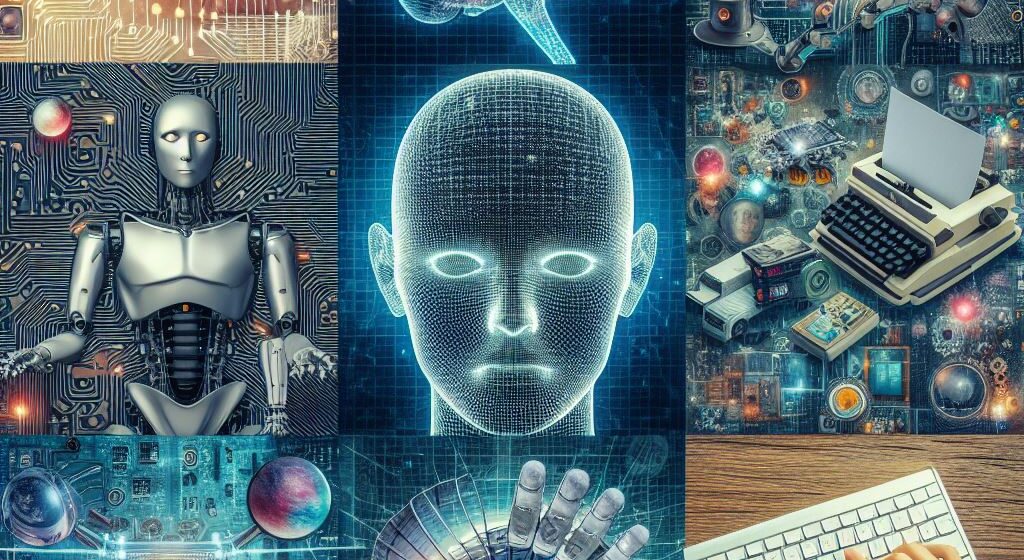Artificial intelligence (AI) is transforming the world in unprecedented ways. It is creating new opportunities, challenges, and possibilities for humanity. But how can we adapt and thrive in the age of AI? How can we leverage AI to enhance our creativity, productivity, and well-being? How can we coexist and collaborate with AI in harmony and synergy? In this post, I will explore some of these questions and share some tips and insights on how to thrive in the age of AI.

Understand AI and its impact
The first step to thriving in the age of AI is to understand what AI is and how it affects various aspects of our lives. AI is a broad term that encompasses many technologies, such as machine learning, natural language processing, computer vision, robotics, and more. AI can perform tasks that normally require human intelligence, such as recognizing faces, understanding speech, playing games, and making decisions. AI can also augment human capabilities, such as enhancing memory, creativity, and communication.
AI has a profound impact on various domains, such as education, health, entertainment, business, and more.
AI can improve the quality and accessibility of education, by providing personalized and adaptive learning experiences, tutoring, and feedback. AI can also improve the quality and efficiency of health care, by providing diagnosis, treatment, and prevention of diseases, as well as monitoring and assisting patients. AI can also enhance the quality and diversity of entertainment, by creating and recommending content, such as music, movies, games, and art. AI can also improve the quality and productivity of business, by automating and optimizing processes, such as manufacturing, marketing, and customer service.
However, AI also poses some challenges and risks, such as ethical, social, and economic issues. AI can raise ethical questions, such as how to ensure fairness, accountability, and transparency of AI systems, and how to protect the privacy, security, and human rights of AI users. AI can also create social issues, such as how to ensure social inclusion, diversity, and equity of AI beneficiaries, and how to prevent social polarization, discrimination, and manipulation by AI agents. AI can also create economic issues, such as how to ensure economic growth, innovation, and competitiveness of AI producers, and how to prevent economic inequality, unemployment, and displacement of AI workers.
Therefore, it is important to understand AI and its impact and to be aware of the opportunities and challenges that AI brings. It is also important to be informed and engaged in the development and governance of AI and to participate in the public discourse and decision-making on AI-related issues.
Develop AI-related skills and competencies.
The second step to thrive in the age of AI is to develop AI-related skills and competencies, that can help us to use, create, and interact with AI systems effectively and responsibly. AI-related skills and competencies can be classified into three categories: technical, cognitive, and social.

Technical skills and competencies are the skills and competencies that enable us to understand, design, and implement AI systems, such as programming, data analysis, machine learning, and AI ethics. Technical skills and competencies are essential for AI developers, researchers, and practitioners, who are directly involved in the creation and innovation of AI systems. Technical skills and competencies can also be useful for AI users, who can benefit from the ability to customize, troubleshoot, and evaluate AI systems.
Cognitive skills and competencies are the skills and competencies that enable us to think, learn, and solve problems in the presence of AI systems, such as critical thinking, creative thinking, and metacognition. Cognitive skills and competencies are important for AI workers, who need to adapt and cope with the changing nature and demands of work in the age of AI. Cognitive skills and competencies can also be important for AI learners, who need to acquire and update their knowledge and skills in the age of AI.
Social skills and competencies are the skills and competencies that enable us to communicate, collaborate, and empathize with other humans and AI systems, such as communication, collaboration, and emotional intelligence.
Social skills and competencies are crucial for AI partners, who need to establish and maintain effective and harmonious relationships with other humans and AI systems. Social skills and competencies can also be crucial for AI citizens, who need to contribute and participate in social and civic life in the age of AI.
Therefore, it is important to develop AI-related skills and competencies and to seek and seize the opportunities to learn and grow in the age of AI. It is also important to recognize and value the unique and irreplaceable human skills and competencies, such as curiosity, imagination, intuition, and compassion, that can complement and enhance AI skills and competencies.
Pursue AI-related passions and purposes
The third step to thrive in the age of AI is to pursue AI-related passions and purposes, that can inspire and motivate us to use, create, and interact with AI systems in meaningful and fulfilling ways. AI-related passions and purposes can be derived from our interests, values, and goals, as well as from societal needs, challenges, and opportunities.
AI-related passions and purposes can help us to discover and pursue new and exciting domains, fields, and careers, that can leverage AI to create positive and impactful outcomes, such as education, health, entertainment, business, and more. AI-related passions and purposes can also help us to explore and express our creativity, identity, and individuality, by using AI to create and share original and authentic content, such as music, movies, games, and art. AI-related passions and purposes can also help us to connect and collaborate with other humans and AI systems, by using AI to communicate and cooperate on common and shared interests, values, and goals.
Therefore, it is important to pursue AI-related passions and purposes and to find and follow our own path and direction in the age of AI. It is also important to balance and align our AI-related passions and purposes with the ethical, social, and economic implications and responsibilities of AI, and to ensure that our AI-related passions and purposes are aligned with the common good and well-being of humanity and the planet.
Create new jobs and opportunities in the age of AI
The fourth step to thrive in the age of AI is to create new jobs and opportunities in the age of AI, that can leverage the skills and competencies that are uniquely human, such as creativity, empathy, and social intelligence. These skills can enable people to pursue careers in domains that require human touch, such as arts, entertainment, education, health care, and social services. These domains can also benefit from the use of AI to augment and enhance human capabilities, rather than replace them. For example, AI can help artists generate new ideas, educators personalize learning, healthcare workers diagnose and treat patients, and social workers support vulnerable communities.
Another way to create new jobs and opportunities in the age of AI is to identify and address the societal needs, challenges, and opportunities that arise from the impact of AI. These needs, challenges, and opportunities can span across various domains, such as environment, security, ethics, and governance.
For example, AI can help monitor and mitigate the effects of climate change, but it can also create new environmental risks, such as energy consumption and e-waste. AI can help to enhance and protect the security of individuals and organizations, but it can also create new threats, such as cyberattacks and surveillance. AI can help to improve the fairness and transparency of decision-making, but it can also create new ethical dilemmas, such as bias and accountability. AI can help foster and facilitate the participation and collaboration of citizens and stakeholders, but it can also create new challenges for the regulation and governance of AI systems and applications.
A third way to create new jobs and opportunities in the age of AI is to embrace lifelong learning and reskilling and to seek and seize opportunities to acquire and update the knowledge and skills that are relevant and valuable in the age of AI. These knowledge and skills can include technical skills, such as programming, data analysis, and machine learning, cognitive skills, such as critical thinking, creative thinking, and metacognition, and social skills, such as communication, collaboration, and emotional intelligence. These knowledge and skills can help people to use, create, and interact with AI systems effectively and responsibly, and to adapt and cope with the changing nature and demands of work in the age of AI. To facilitate lifelong learning and reskilling, it is important to have access to quality and affordable education and training, as well as to supportive and inclusive policies and practices that encourage and enable learning and career development.
Prevent and reduce inequality and monopoly in the age of AI
The fifth and final step to thriving in the age of AI is to prevent and reduce the inequality and monopoly that may result from the use and deployment of AI. Some possible ways to achieve this are:
- Promoting and supporting the innovation and entrepreneurship of small and medium enterprises (SMEs) and social enterprises that can leverage AI to create positive and impactful outcomes, such as improving the quality and accessibility of goods and services, solving social and environmental problems, and empowering and engaging communities. SMEs and social enterprises can also provide more diverse and inclusive employment opportunities, and foster more resilient and sustainable economies.
- Regulating and taxing the large and dominant corporations that use and produce AI, and ensuring that they comply with the ethical, social, and environmental standards and responsibilities of AI. This can help to prevent the abuse and misuse of AI and to ensure that the benefits and costs of AI are shared fairly and equitably among the stakeholders and society. This can also help to generate and redistribute the revenues and resources that can be invested in the public good, such as education, health care, and social welfare.
- Strengthening and protecting the rights and interests of the workers and consumers who are affected by
What are your AI-related passions and purposes, and how do you pursue them in the age of AI? Share your stories and insights in the comments below.



